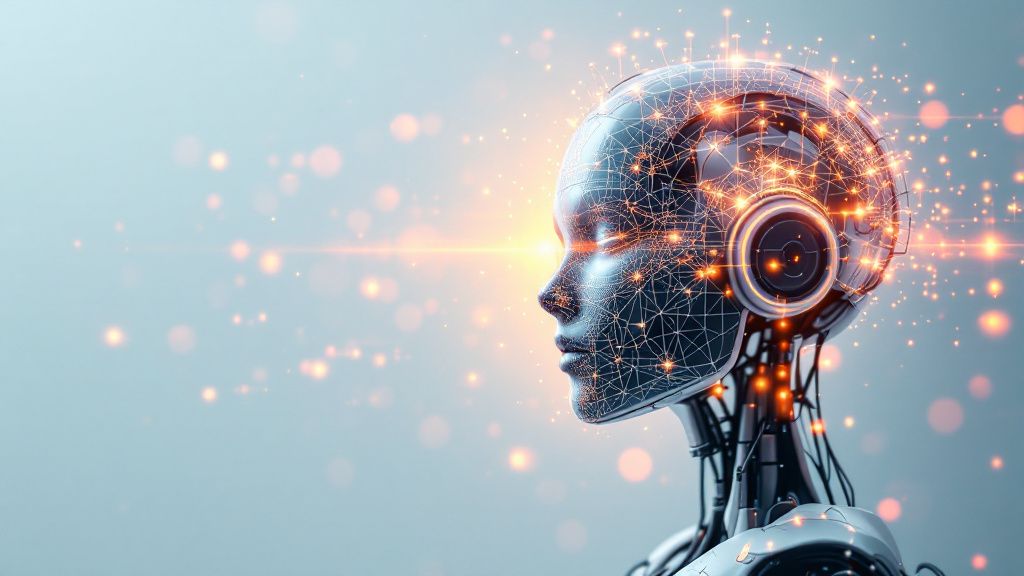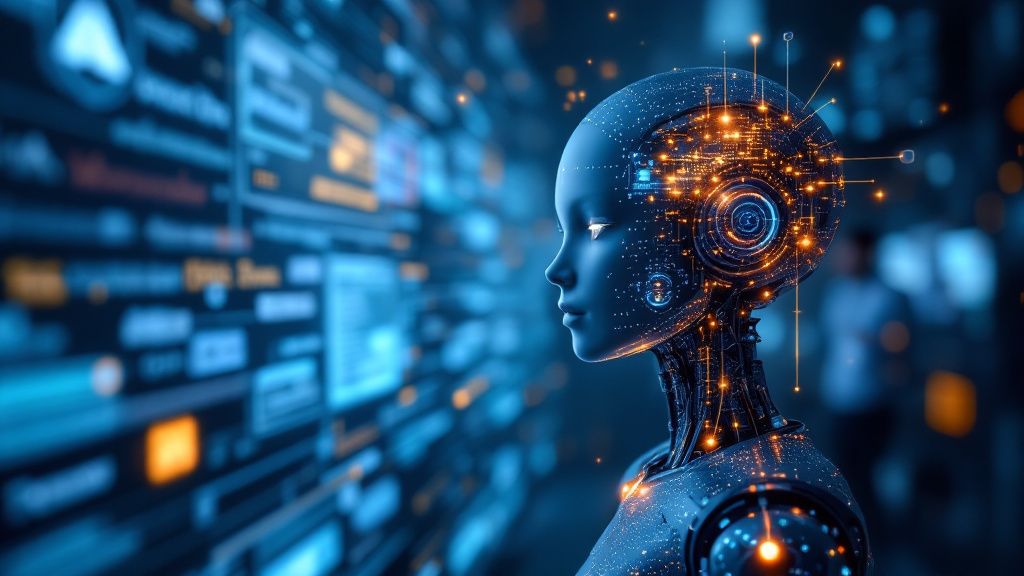Artificial Intelligence (AI) stands as a pivotal force, reshaping how you perceive and interact with the world. Imagine a future where AI is embedded seamlessly into everyday life, creating innovative solutions and unprecedented opportunities. This transformation isn't limited to personal gadgets; it extends into the corporate arena as well. AI for business opens doors to efficiency and precision, allowing companies to revolutionize their operations. With smart algorithms and data-driven strategies, implementing AI in business helps you stay competitive in a rapidly evolving digital landscape. As you ponder the future of artificial intelligence, envision a dynamic world where AI is an integral companion in progress.

Understanding the Basics of Artificial Intelligence
Artificial Intelligence fundamentally changes how systems think and solve problems. At its core, it simulates human intelligence in machines through programs that learn and adapt. Despite its complexity, the transformation is fundamentally about enhancing your everyday activities. However, a significant challenge in understanding AI is grasping how machines process information. This hurdle is overcome by machine learning algorithms that enable systems to mimic human decision-making processes by analyzing vast datasets and recognizing patterns. Through this, AI becomes more approachable and effective in practical applications, such as enhancing personal devices and boosting business operations.
AI's impact is not just about making life easier. It also empowers you to envision new possibilities. One problem you might face as a business leader is juggling multiple tasks efficiently. Implementing AI in business provides a solution through automation, which optimizes processes and maximizes productivity. Moreover, as AI technology evolves, it lays down the blueprint for the future of artificial intelligence. This evolution promises more personalized, intuitive systems that adapt to your needs, opening avenues for innovation while ensuring a smoother, more connected experience across various sectors.

Machine Learning as a Subset of AI
Machine Learning stands out as a vital component of Artificial Intelligence. Unlike traditional programming, it equips computers with the ability to learn from data without being explicitly programmed. This capability allows machines to automatically improve their performance based on experience, making them adaptable and dynamic tools for various tasks. Its influence spans numerous industries, enhancing problem-solving approaches and driving innovation.
In the context of AI for business, machine learning plays a critical role. It enables you to harness data, providing insights that drive strategic decisions. By using machine learning models, businesses can predict trends, personalize customer experiences, and streamline operations, all of which are essential for staying competitive. Implementing AI in business becomes evident in optimizing logistics, tailoring marketing strategies, and improving product recommendations.
According to recent studies, scientific findings reveal that supervised and unsupervised learning, two primary methods of machine learning, significantly enhance data processing and predictive analytics capabilities. This explains how industries today can effectively anticipate market demands and customer preferences. As the future of artificial intelligence unfolds, these methods continue to shape your interactions with technology, steering you into new realms of innovation and efficiency.

Deep Learning and Neural Networks
Deep Learning is an advanced facet of Artificial Intelligence, primarily fueled by neural networks that mimic human brain functions. These networks consist of layers of interconnected nodes, or neurons, which process data in ways that outstrip traditional models' capabilities. By doing so, they enable machines to recognize patterns and perform complex computations, pushing the boundaries of what AI can achieve.
Neural networks are pivotal in unlocking the potential of AI for business. Through deep learning, these networks analyze vast amounts of unstructured data, providing insights that enhance decision-making processes. This approach fosters innovation, allowing businesses to optimize workflows and predict future trends with great accuracy. By implementing AI in business through this technology, you can handle complex challenges with ease.
To truly grasp deep learning and neural networks, you need to shift your mindset from seeing AI as merely computational machines to viewing them as cognitive partners. This new perspective emphasizes collaboration between human intuition and machine precision, opening doors to novel applications in sectors such as healthcare and finance. As the future of artificial intelligence unfolds, embracing this shift will guide you in leveraging AI's full potential.

Natural Language Processing in AI
Natural Language Processing (NLP) is a groundbreaking element of AI, transforming how you interact with machines through speech and text. By enabling computers to understand and process human language, NLP revolutionizes communication. It powers everything from voice-assisted devices to sophisticated translation services. Bridging the gap between human communication and digital interfaces, NLP plays a crucial role in advancing AI for business applications.
One of the most intriguing aspects of NLP is its ability to adapt to various languages and dialects, making technology more accessible to diverse populations. For example, implementing AI in business through NLP can enhance customer service by providing instant, accurate responses. This improvement fosters customer satisfaction and creates a more personalized interaction experience in real-time business operations.
What most people don’t realize about NLP is the intricate algorithms and data structures working quietly behind the scenes. These are the mechanisms that analyze and interpret vast amounts of natural language data to produce coherent and contextually relevant responses. This behind-the-scenes detail is what differentiates ordinary software from the more dynamic, intuitive AI systems that define the future of artificial intelligence, allowing you to engage with technology in a more human-like manner.

AI in Healthcare: Revolutionizing Patient Care
Artificial Intelligence is making waves in healthcare by dramatically improving patient care through innovative technologies. Its application ranges from precise diagnostics to personalized treatment plans, offering a new level of accessibility and efficiency in medical services. By analyzing vast amounts of medical data, AI systems can predict patient outcomes with remarkable accuracy, transforming how healthcare providers approach patient care.
AI's role in healthcare isn't without differing perspectives. On one hand, proponents view AI as a revolutionary tool that enhances medical practices, allowing for faster and more accurate diagnoses and treatment plans. Critics, however, argue that this reliance may overshadow the human touch that is vital in healthcare. These contrasting perspectives shed light on the need to find a balance between cutting-edge technology and personal patient interactions.
Integrating AI into healthcare does more than just improve treatment; it also optimizes hospital operations. Implementing AI in business models within healthcare facilities can streamline administrative tasks, freeing up time and resources for patient-centered activities. As the future of artificial intelligence unfolds, its success in healthcare will rely on harmonizing technological advancements with empathetic care, ensuring that patient trust and satisfaction remain at the forefront.

Autonomous Vehicles Driving the AI Frontier
Autonomous vehicles represent a significant leap in AI technology, altering how transportation is perceived and implemented. These self-driving cars utilize advanced sensors and algorithms to navigate roads without human intervention, showcasing how far AI has come in simulating human-like decision-making on the road. This innovation not only enhances road safety but also revolutionizes logistics and urban planning, marking a pivotal moment in transportation history.
Comparing autonomous vehicles to traditional cars reveals stark differences in capabilities and functionalities. While conventional vehicles rely entirely on human input for navigation and decision-making, self-driving cars leverage AI to process information in real-time, adapting to road conditions and potential hazards instantly. This shift places autonomous vehicles at the forefront of the AI frontier, highlighting their potential to redefine transportation standards globally.
AI's growing integration within the automotive industry also influences business models significantly. Implementing AI in business through autonomous vehicle technology encourages the development of new infrastructure, shifting how companies approach fleet management and delivery services. As the future of artificial intelligence progresses, these advancements carry promising prospects for efficiency and innovation, underscoring AI's transformative impact across different sectors.


.jpg)

.jpg)
.webp)
.webp)
.webp)


.svg)









